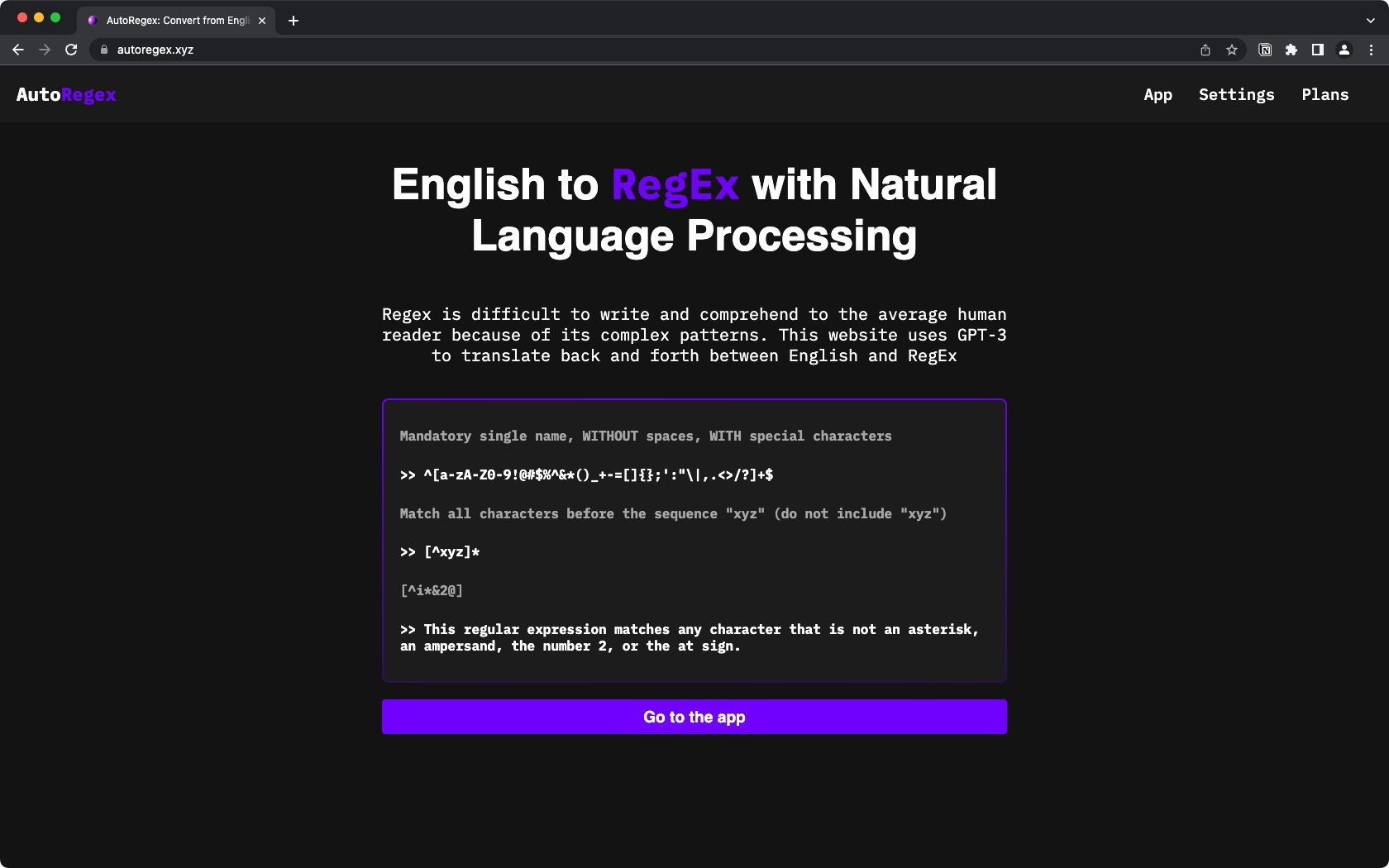26 Jul 2022
New app:
"English to RegEx with Natural Language Processing"
"Regex is difficult to write and comprehend to the average human reader because of its complex patterns. This website uses GPT-3 to translate back and forth between English and RegEx"
https://www.autoregex.xyz/

Script examples
spilt on first uppercase letter in string
Given the following, I want to split each string on first uppercase letter to separate command and description (separated by a variable amount of spaces, no tab):
'afconvert Audio File Convert'
'afinfo Audio File Info'
'afplay Audio File Play'
'airport Manage Apple AirPort'
'alias Create an alias •'
'alloc List used and free memory'
'apropos Search the whatis database for strings'
'asr Apple Software Restore'
'atsutil Font registration system utility'
working code:
import re
for row in ws:
count_row += 1
first = row[0].value.strip()
command = [s for s in re.split("([A-Z][^A-Z]*)", first) if s][0].strip()
description = re.findall('[A-Z][^A-Z]*', first)[0]
print(f"{command=}")
print(f"{description=}")
print()
regex email addresses
x=re.search('(\w+[.|\w])*@(\w+[.])*\w+',email4)
x.group()
# EXAMPLE:
x = '(\w+[.|\w])*@(\w+[.])*\w+'
listEmails = list()
with open('/path/to/folder/recipients.txt', 'r') as f:
f = f.read()
string = str(f)
array = string.split(",")
for x in array:
x = x.split('<', 1)[1]
x = x.split('>', 1)[0]
print(x)
listEmails.append([x])
print(list)
remove invisible characters
import re
##GETS RID OF SPACES
# string contains the \u2003 character
string = u'This is a test string ’'
# this regex will replace all special characters with a space
re.sub('\W+',' ',string).strip()
#PRESERVES SPACES:
re.sub('[^!-~ ]+',' ',country).strip()
capitalise sentence
25 Sep 2022
def capitalise_sentence(og_string, v=False):
if v:
print(f"---start verbose capitalise_sentence (deactivate with v=False)")
print(f"\n{og_string=}")
# lowercase everything
lower_s = og_string.lower()
if v:
print(f"\n{lower_s=}")
# start of string & acronyms
final = re.sub(r"(\A\w)|"+ # start of string
"(?<!\.\w)([\.?!] )\w|"+ # after a ?/!/. and a space,
# but not after an acronym
"\w(?:\.\w)|"+ # start/middle of acronym
"(?<=\w\.)\w", # end of acronym
lambda x: x.group().upper(),
lower_s)
if v:
print(f"\nstart_string {final=}")
# I exception
if ' i ' in final:
final = final.replace(' i ', ' I ')
if v:
print(f"\n' i ' {final=}")
if " i'm " in final:
final = final.replace(" i'm ", " I'm ")
if v:
print(f"\n' i'm ' {final=}")
if v:
print(f"\nreturned repr(final)={repr(final)}\n\n---end verbose capitalise_sentence\n")
return final
s = "hey. how are you? i'm A.F.K. At the Moment but i don't Mind! "
test = capitalise_sentence(s, v=True)
print(test)
outputs:
---start verbose capitalise_sentence (deactivate with v=False)
og_string="hey. how are you? i'm A.F.K. At the Moment but i don't Mind! "
lower_s="hey. how are you? i'm a.f.k. at the moment but i don't mind! "
start_string final="Hey. How are you? I'm A.F.K. at the moment but i don't mind! "
' i ' final="Hey. How are you? I'm A.F.K. at the moment but I don't mind! "
returned repr(final)="Hey. How are you? I'm A.F.K. at the moment but I don't mind! "
---end verbose capitalise_sentence
Hey. How are you? I'm A.F.K. at the moment but I don't mind!
inspired by & tweaked from https://stackoverflow.com/questions/19785458/capitalization-of-sentences-in-python
